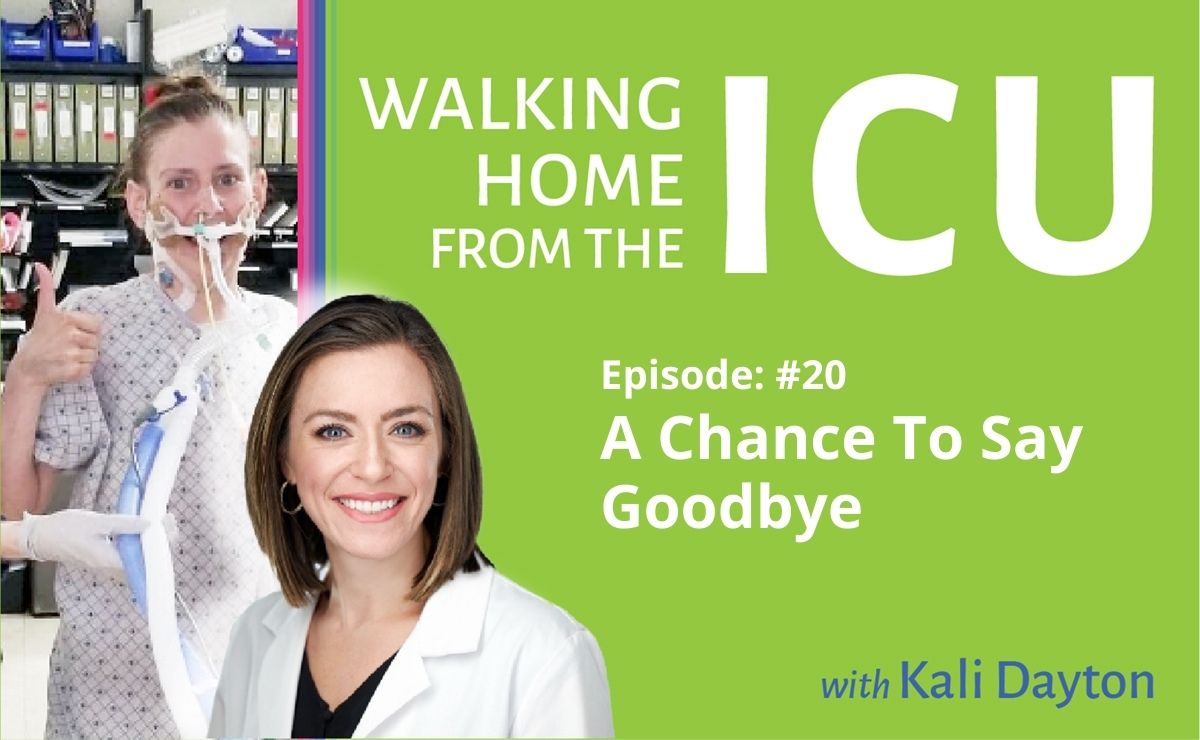SUBSCRIBE TO THE PODCAST
Though avoiding sedation and mobility decreases mortality, death is not always avoidable. Kali discusses how being awake and mobile during critical illness impacts your last mortal moments and what it looks like to have a chance to say goodbye.
Episode Transcription
Kali Dayton
This episode, I want to share three sacred stories of patients that cannot tell themselves. Their outcomes were different, but still so wonderful. Though decreasing sedation causes a decrease in mortality, survival is not always in the cards for some of our ICU patients.
Even when they are awake, walking and working so hard. The first patient was one that I cared for as a nurse. He was in his 50s with severe interstitial lung disease, or ILD. I was blessed to be his nurse for each of my shifts for nearly a month. He was never sedated and it was so fun to get to know him. I knew his favorite song plans, the meal he was looking forward to eating after extubation,and all his preferences.
Unfortunately, though, it became clear that his ILD was not getting better.. and that his plans were not going to be actualized. I was honored to have many intimate end of life discussions with him and his wife. He continued to fight, but he was getting tired. One morning at about 5am, I heard tapping of the oxygen probe on the bed. I ran in to find him anxious and restless, which was not normal for him.
I started to try to make uncomfortable by adjusting the pillow the blanket when suddenly he grabbed my wrist and locked my eyes in on him. And he mouthed, “I’m dying.”- I instinctively looked at the monitor to confirm that statement. When I suddenly realized what he really meant. I slowly turned it back to him and said, “You’re dying?”
He desperately nodded his head. And I said, “Are you ready to go?” And he slowly and peacefully nodded his head. I said, “Do you want me to wake your wife up?” He confirmed. I woke up his wife who was asleep on the couch in the room and said, “Hey, he’s ready. And he wants to talk to you.”
I left the room. But his wife later told me that he asked if she would be okay. She promised she would. She told him to go be with their deceased son and that she would be fine until they were together again. They expressed their love to each other. And then she asked me, “Okay, let’s do this. How do we do it?” I got to say goodbye to him. We gave him morphine, the Ativan. And as we extubated him, he was calm and resolute.
I sang his favorite song and he quickly slipped away. It was one of the most sacred moments of my life and career. Had this patient and friend been sedated, his final mortal moment would have been so different for himself and his family. By being awake and unaltered, his autonomy and rights were preserved.
He was able to call his own shots, and his wife was free of the burden of such huge decisions. He was allowed to connect with his loved ones and say goodbye to his soulmate, before they were separated. This is what I would want for myself.
The second story was a man in his 40s that had battled leukemia. His immunosuppression had caused a viral fungal and bacterial lung infections. He was awake and intact during his weeks on the ventilator. His family would have huge parties and gatherings in his room, and he was determined to make it for them. Despite his best efforts and all possible treatments, his lungs were getting worse. He was informed of the reality and severity of his condition the entire time. He appeared optimistic, but was simultaneously preparing himself. When I sat with him and his wife and explained to them that this appear to be the end of his mortality. It was peaceful. I told them that it was his party and could be how he wanted it.
Despite his youth, he had been allowed the time to prepare himself for an early death. He called in his family and made his party plans. They had his chosen music, everyone he wanted was there, memorable pictures, and a huge glass of coca cola with ice. He was able to express his love to his six children and wife, be extubated, and quickly sip his Coca Cola… and he peacefully passed.
The third patient was admitted and intubated for severe respiratory failure only to find that he had extremely advanced terminal lung cancer. Because he was awake and unaltered. He was able to arrange his final affairs and connect with his wife and children.
Though he was struggling at the very end, he refused to let go until the last paper was signed, and he was assured that his wife would receive all of his pension. He was able to be released from this life, with his permission, on his time, and having the peace and order that he needed. Automatic deep sedation would have robbed him of weeks with his family, preparation for death, and the chance to say goodbye. By avoiding sedation, we keep patient’s hands on the wheel. We allow them to play an active role in their own journey, even until the end by preserving their capacity. We spare family the pain and burden of end of life choices and gift them with a chance to have closure and peace. This is what I would want for my final moments, a chance to say goodbye.
Transcribed by https://otter.ai
SUBSCRIBE TO THE PODCAST




